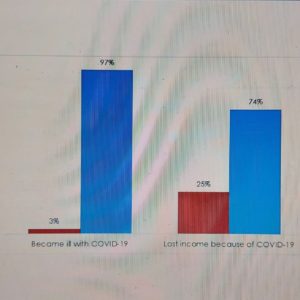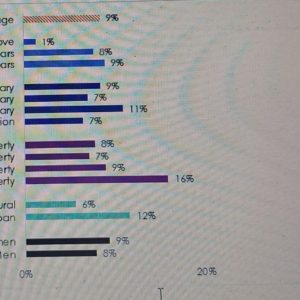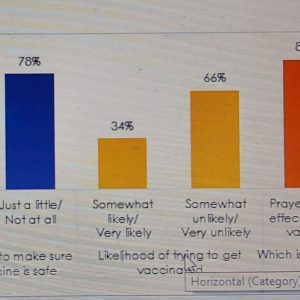A report from an Afro Barometer survey released in Monrovia recently says although most Liberians approve the way the CDC government of President Weah responded to the COVID-19 pandemic, they are dissatisfied with the what they claim is the unfair distribution of the food stimulus package.
The findings of the survey is contained in the press release below released by the Center for Democratic Governance.
Monrovia, Liberia
20 January 2021
News release
Liberians laud government’s COVID-19 response but claim unfair distribution of relief assistance, new Afrobarometer study shows
A majority of Liberians approve of the government’s performance in managing the response to the COVID-19 pandemic, including necessary lockdowns, a new Afrobarometer survey shows.
But most believe that COVID-19 relief was not distributed fairly. Better-off citizens and urban residents were about twice as likely as the poor and rural residents to benefit from this assistance, and older citizens appear to have been largely overlooked.
A quarter of citizens say their households lost income because of the pandemic. While most citizens support the lockdown as necessary, most also found it difficult to comply with the restrictions.
The study also shows a less-than-encouraging attitude toward vaccines: Few Liberians trust their government to ensure that COVID-19 vaccines are safe, and only one-third say they are likely to try to get vaccinated. Most say prayer is more effective than a vaccine in preventing the spread of COVID-19.
Key findings
- Three in 100 citizens (3%) say they or a member of their household became ill with COVID-19, and a quarter (25%) say they lost income because of the pandemic (Figure 1).
- About eight in 10 Liberians (81%) say they found it “difficult” or “very difficult” to comply with COVID-19 lockdown restrictions.
- But a similar majority (83%) “agree” or “strongly agree” that the lockdown was necessary, in spite of the toll it took on the economy and people’s livelihoods.
- Seven in 10 (71%) also “somewhat support” or “strongly support” the closure of schools to limit the spread of the coronavirus.
-
- But most think the period during which schools were closed was “somewhat too long” (23%) or “much too long” (59%).
- Fewer than one in 10 Liberians (9%) say they or their households received government assistance during the pandemic (Figure 2).
- Economically well-off citizens (those experiencing no lived poverty) (16%) are twice as likely as relatively poorer citizens (those experiencing low, moderate, or high lived poverty) (7%-9%) to report receiving assistance. Urban residents were twice as likely as rural dwellers to receive relief (12% vs. 6%). And only 1% of those aged over 55 say they received assistance.
- About eight in 10 (78%) citizens say the benefits of government programs to support people during the COVID-19 pandemic were not distributed fairly (Figure 3).
- Majorities say the government is doing “fairly well” or “very well” in managing the response to the pandemic (64%) and keeping the public informed (80%) (Figure 4).
- However, only three in 10 (30%) say they trust government statistics on COVID-19. And eight in 10 (81%) think that “some” or “a lot” of the resources that were available for combatting the COVID-19 pandemic were lost or stolen due to corruption among government officials.
- Only two in 10 Liberians (20%) say they trust the government “somewhat” or “a lot” to ensure that any COVID-19 vaccine is safe before it is used in the country (Figure 5).
- Only one-third (34%) say they are likely to try to get vaccinated if a vaccine becomes available.
- Almost nine in 10 citizens (86%) say prayer is more effective than a vaccine would be in preventing COVID-19 infection, including 61% who think prayer is “much more effective.”
- Two-thirds (66%) of Liberians say the government needs to invest more in preparing to respond to health emergencies like COVID-19, even if it means fewer resources are available for other health services.
Afrobarometer surveys
Afrobarometer is a pan-African, nonpartisan survey research network that provides reliable data on African experiences and evaluations of democracy, governance, and quality of life. Seven rounds of surveys were completed in up to 38 countries between 1999 and 2018, and Round 8 surveys are currently underway. Afrobarometer conducts face-to-face interviews in the language of the respondent’s choice.
The Afrobarometer team in Liberia, led by the Center for Democratic Governance, interviewed a nationally representative, random, stratified probability sample of 1,200 adult Liberians between October and December 2020. A sample of this size yields country-level results with a margin of error of +/-3 percentage points at a 95% confidence level. Previous standard surveys were conducted in Liberia in 2008, 2012, 2015, and 2018.
Charts
- Figure 1: Impacts of the pandemic | Liberia | 2020

- Respondents were asked: Please tell me if you personally or any other member of your household have been affected in any of the following ways by the COVID-19 pandemic: Became ill with COVID-19? Temporarily or permanently lost a job, business or primary source of income?Figure 2: Received government assistance | by socio-demographic group | Liberia | 2020

- Respondents were asked: Since the start of the COVID-19 pandemic, have you or your household received any assistance from government, like food, cash payments, relief from bill payments, or other assistance that you were not normally receiving before the pandemic? (% “yes”)
- Figure 3: Fairness of government assistance | Liberia | 200

- Respondents were asked: Do you think that the benefits of government programs to support people during the COVID-19 pandemic, for example through food packages or cash payments, have been distributed fairly, or that the distribution was unfair, for example by favoring certain groups or regions?Figure 4: Assessment of government effort during the pandemic | Liberia | 2020

- Respondents were asked:How well or badly would you say the current government has handled the following matters since the start of the COVID-19 pandemic, or haven’t you heard enough to say: Managing the response to the COVID-19 pandemic? Keeping the public informed about COVID-19?How much do you trust the official statistics provided by government on the number of infections and deaths due to the COVID-19 pandemic?Considering all of the funds and resources that were available to the government for combatting and responding to the COVID-19 pandemic, how much do you think was lost or stolen due to corruption among government officials?
Figure 5: Attitudes toward COVID-19 vaccines | Liberia | 2020

- Respondents were asked: How much do you trust the government to ensure that any vaccine for COVID-19 that is developed or offered to Liberian citizens is safe before it is used in this country?If a vaccine for COVID-19 becomes available and the government says it is safe, how likely are you to try to get vaccinated?
Some people think that prayer is an effective way to alter events in the world. Others put more faith in science to solve problems. Some people believe in both. What about you? Do you think that prayer is more effective or less effective than a vaccine would be in preventing COVID-19 infection?
For more information, please contact:
Center for Democratic Governance
Telephone: +231 88 655 4109
Email: varpubloh@gmail.com
Visit us online at:
Cdglib.org
Follow our releases on #VoicesAfrica.
/Afrobarometer @Afrobarometer

